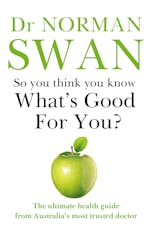
The Greek Paradox: Exploring the best diets for longevity and wellbeing
SATURDAY 02 JAN, 2021Who is the migrant group with the highest life expectancy in the world, second to the Japanese? The answer may surprise you...
When he was growing up, Dr Norman Swan’s hometown of Glasgow was home to the highest rate of heart disease in the world. What’s more, the life expectancy gap between the richest and poorest suburbs was around 25 years. Fried food and salt were part of the cause. Now one of our leading health communicators and a much-respected broadcaster, Dr Norman Swan knows how to combat heart disease and live longer. In his new book So You Think You Know What’s Good for You? Norman replaces medical myths, half-truths, and misconceptions with the information you need to make better decisions about how to eat and how to live.
Question: Which group has the highest life expectancy in the world second to the Japanese?
The answer may surprise you - it is Greek Australians.
Dr Swan refers to this as the Greek Paradox. Why? Because elderly Greek Australians are 2-3 times more likely to be obese, have diabetes, high cholesterol, and high blood pressure than Anglo Australians. Yet they are 35% less likely to die prematurely of heart disease and their age-adjusted risk of cancer is lower too.
Dr Swan suggests that these results are the product of adherence to tradition. When Greek migrants arrived in Australia, they adopted the Australian diet: high calorie, high saturated fats, including lots of red meat, sugar and white bread. As they aged, they returned to a typical Greek Orthodox diet – close to what we now know as the Mediterranean diet but that’s only a small part of why they live longer. It’s far more than diet. So we need to learn from our Greek Australian elders and here are the top takeaways:
Eat and cook at home - and if possible, eat with other people
The traditional Mediterranean dietary pattern is founded on home cooking, using fresh ingredients. It also typically would be served at the dinner table, rather than in front of the TV. Cooking at home allows us to prioritise the quantity and quality of the ingredients in our food. Eating at the table lets us savour our food more and lets us recognise when we are full more quickly.
Cook slowly and incorporate flavours
Incorporating extra virgin olive oil, garlic, onions, herbs, and spices into our diet assists our bodies in reducing inflammation and possibly reduces the risk of long-term cancer.
Chop up your veg and don’t be shy with olive oil and vinegar. If possible, make it red!
Dicing up vegetables, such as tomatoes and capsicum, and combining them with simple dressings such as olive oil and vinegar releases micronutrients known as polyphenols. Red and reddish vegetables are potent sources of natural antioxidants like beta carotene and lycopene, which have a particularly strong antioxidant effect.
Incorporate lots of garlic, onions, shallots, and chives into your cooking
These belong to the Allium family and contain sulphur compounds, which research indicates may have cancer prevention activity.
When possible, take a nap after lunch and, if you have the space, consider a veggie patch
Siestas have been linked to lower blood pressure and decreased heart disease. Gardening and eating your own produce ensures the quality of vegetables, but also involves some rigorous exercise.
Vegan fasting
Research has found that as Greek Australians age, they return to religion and one of the dominant features of Greek Orthodoxy is the huge number of fast days there are in the calendar. Greek Orthodox fasts are effectively vegan fasts, where, especially on the islands, for a day they don’t eat meat, fish or dairy, just plant-based foods, usually grown in their backyards. Here is the quick health tip. Deny yourself meat, fish, and dairy every Monday and Thursday.
Related news
 loading...
loading...
Meet Dr Norman Swan as he tours Australia to promote his new book - So You Think You Know What's Good For You?
 loading...
loading...
Quiz: Sleep, screens, and social media
Think you know what’s good for you when it comes to all things sleep, screens and social media? Take the quiz to find out!
 loading...
loading...
Take Our Quiz to Test Your Knowledge on Mental Health
So you think you know about mental health? Take our quiz to find out.
 loading...
loading...
How To Manage Your Mental Health
It seems we are facing an anxiety epidemic. Why are we stressed and feeling burnt out? And, more importantly, what can we do to resolve that?
 loading...
loading...
Test Your Diet Knowledge With Our Quiz
We all want to be healthier, but do you know what's good for you? Take our quiz to find out.




.png?auto=compress&w=150&h=60&fit=crop&fm=jpg)

.png?auto=compress&w=150&h=60&fit=crop&fm=jpg)


